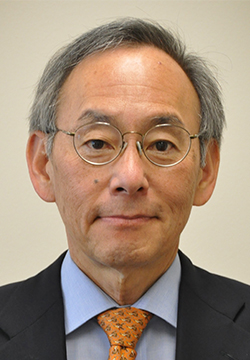Steven Chu


Professor Steven Chu
Doctor of Science, honoris causa (2021)
Professor Steven Chu is a co-recipient of the 1997 Nobel Prize in Physics for his work on “the development of methods to cool and trap atoms with laser light”. He has received numerous other awards from around the world.
Professor Chu attributes his success to his family background. As he puts it: “It’s probably my genes. I chose my parents wisely!”. He is very much an educated man from an educated family, coming from a long line of University academics. His two brothers, and four cousins have four PhDs, three MDs and a JD between them — that’s excluding honorary degrees, of course.
Since his early childhood Professor Chu has worked with his hands, building model airplanes, playing with chemistry sets and the like. “I played around with stuff. I built stuff.
I started to try to teach myself to cook when I was in elementary school.” This was significant later, as unlike many gifted physicists who prefer to become pure theorists, Professor Chu decided during his graduate study that he wanted to do experimental work. It is his interest in the practical, along with a fascination for theory, that has shaped him as a scientist.
Coming originally from China, Professor Chu’s parents emigrated to the USA. They both studied at MIT and his father taught at Washington University in St Louis and at Brooklyn Polytechnic Institute in New York. They raised their family in a suburb on Long Island. Professor Chu describes his childhood as a “typical immigrant story”, with a strong emphasis on education and hard work, including odd jobs such as paper rounds and shoveling snow. He and his siblings understood that they would not enjoy great privilege and there was an expectation in the family that he, his brothers, and his cousins would all get PhDs in science.
Professor Chu’s older brother did very well in school, setting records for the highest cumulative average, and as the younger brother he was expected to follow suit. However, Professor Chu feels he lacked the keen discipline of his older brother, and as a 9th grader he announced “I’m not going to go to school anymore”. His parents were, not surprisingly, distraught and eventually persuaded him to resume his education after two and a half months. He took the examinations, did quite well, but failed to match his families’ expectations. He was the first of that generation not to get into Princeton or Harvard. In his own words: “I was a big disappointment”.
He was accepted by the University of Rochester, and in hindsight he feels it was the best thing that could have happened to him. He bloomed. He discovered that he enjoyed study, completing his undergraduate classes by his junior year and building up a close relationship with the mathematics department, being regularly invited to their faculty parties! He graduated with a double major in mathematics and physics, and then went on to complete his PhD in Physics at the University of California, Berkeley.
Professor Chu is currently the William R. Kenan, Jr. Professor of Physics and also Professor of Molecular & Cellular Physiology at Stanford University. He has published more than 280 scientific papers in atomic and polymer physics, biophysics, biology, biomedical imaging, nanoparticle synthesis and applications in biology and materials science, lithium-ion batteries, and other applications in electrochemistry. He holds 15 patents.
In addition to his academic work, Professor Chu has been active in public life and public policy. He has spoken out about the risks of climate change and global warming due to the reliance on fossil fuels, and he has been a strong advocate of energy efficiency, renewable energy and nuclear power. To further combat climate change, he has called for increased research and development to significantly lower the cost of grid and electric vehicle energy storage, and for the agricultural revolution required to decarbonise food production for a world of 11 billion people.
From January 2009 until April 2013, Professor Chu served in President Obama’s Cabinet, as the 12th US Secretary of Energy. He was the second Chinese American and the first practising scientist to be a member of the US Cabinet. He was also the first person appointed to the US Cabinet having already won a Nobel Prize. He made a point of recruiting outstanding scientists and engineers into the Department of Energy and launched several new initiatives, including the Advanced Research Projects Agency-Energy, the Energy Innovation Hubs, and the Clean Energy ministerial meetings. He was personally tasked by President Obama to assist BP in dealing with the Deepwater Horizon oil leak in 2010, an assignment from which he derived a great deal of personal satisfaction.
Professor Chu is an old friend of Hong Kong Baptist University (HKBU). He spent a week here in 2006, coinciding with the University’s 50th anniversary, giving talks to HKBU colleagues and students. Colleagues from the Department of Physics have also visited Professor Chu’s laboratory in the US.
Recognising that we live in challenging times, Professor Chu is nevertheless optimistic about what he sees as the reemerging idealism of the new generation and their receptiveness to addressing world problems such as climate change. He advises young people to recognise the privileges afforded by their university education and to use that education not only to have a rewarding career, but also to help society deal with the broader social problems we now face.
A brilliant physicist and Nobel Laureate with an active interest in multi-disciplinary problems, practical applications and public policy, Professor Steven Chu is nominated for the award of Doctor of Science, honoris causa.